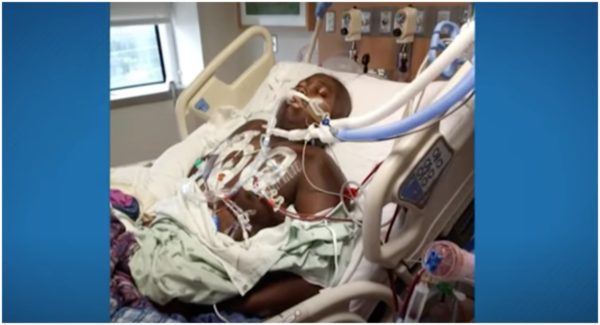Latonya Payne, the legal guardian of her nephew Corinthian Giles, has sued the city of Houston, Texas, and Union Pacific Railroad after her nephew died from leukemia, which she believes was caused by toxic chemicals in the neighborhood.
Payne is one of thousands of individuals in Houston who have brought forward lawsuits that claim the railroad company is responsible for the ill effects they’ve suffered from their properties and groundwater being contaminated with toxic chemicals that came from the nearby rail yard for decades.
The lawsuit was filed last week in Harris County District Court and claims that Union Pacific attempted to cover up how serious the contamination was and furthermore, failed to clean it up. The suit also claims that the city of Houston failed to warn the residents of the potential dangers or reduce the risk of poisoning which several reports claimed caused cancer.

Following a five-year battle with his illness, Giles died July at 13. The young boy grew up two blocks away from Union Pacific’s Englewood Railyard and former creosote treatment plant in Houston’s Greater Fifth Ward area, where reportedly 100 properties were affected.
The creosote was used to treat railroad ties at the yard, which operated from 1895 to 1984 and become Union Pacific’s property in 1996 when the company bought the Southern Pacific Railroad.
The Environmental Protection Agency says creosote, a wood preservative, is a probable carcinogen, and waste creosote from the decades of use at Englewood is thought to have leached into the ground and formed an underground plume that has affected nearby homes.
In late 2019, Texas health officials confirmed the neighborhood has a cancer cluster, which is defined by the Centers for Disease Control and Prevention as “greater-than-expected number of cancer cases that occurs within a group of people in a geographic area over a period of time.”
In addition, six months before Giles’ death, last January, the state health department reported that the childhood leukemia Giles died from occurred five times more often than the national average.
In December 2020, health officials reported that, “The results of the analysis of 40 passive soil vapor gas samples conducted by a consultant for the Houston Health Department at locations over the groundwater plume associated with the Union Pacific Railroad site were received.”
They added, “Very few contaminants were detected and those that were detected were very low levels, close to the reporting limit. These data do not indicate inhalation risk from soil vapor contamination.”
“Children are dying from contamination that has been spreading for decades. Enough is enough. Union Pacific and the City of Houston need to accept responsibility and take action to remedy this tragedy immediately,” Giles’ attorney, Jason Gibson of The Gibson Law Firm said in a statement to Belle News. At this moment, it’s unclear what the plaintiffs are seeking as compensation.
More content from our partners:
Kareem Abdul-Jabbar Unleashes On Aaron Rodgers Over Vaccine Controversy
Soccer Player Accused of Hiring Goons to Attack Teammate In Order To Gain Playing Time


